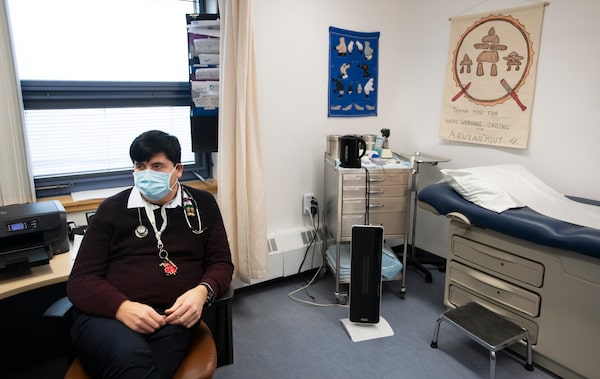
Dr. Carl LeRoux works in his office at the Arviat Health Centre in Arviat, Nunavut, on Oct, 24.Fred Lum/The Globe and Mail
Manitoba has reopened its only pediatric intensive-care unit to patients from Nunavut, reversing a policy that had doctors in the territory’s central region scrambling to find alternative hospitals willing to admit severely ill Inuit children.
In a memo sent to Nunavut health leaders on Tuesday, Manitoba Health announced the change to Health Science Centre (HSC) Winnipeg Children’s Hospital – one day after The Globe and Mail published a story on the hardship faced by young patients and their families.
“Canada is currently experiencing a wave of viral respiratory illnesses, resulting in unprecedented hospital admissions to pediatric hospitals,” the memo reads. “To support our catchment areas of Nunavut and Kivalliq, HSC Winnipeg Children’s Hospital will resume acceptance of medical and surgical transfers from these areas effective November 7, 2022.”
Francois de Wet, the chief of staff for Nunavut and its only hospital, called the reversal “an immense relief.”
In August, Manitoba enacted a temporary policy that effectively barred patients under the age of 18 from Nunavut and Northwestern Ontario who were highly likely to require intensive care. The policy did not apply to children seeking scheduled care, babies bound for the neonatal intensive care unit or children facing “immediate threat to life and limb.”
Unlike Ontario, Nunavut has no intensive-care units of its own. What it does have is a young population with the highest rate of hospital admissions for lower-respiratory tract infections of any province or territory, owing to poverty, overcrowded housing and high rates of smoking.
In a territory of just under 40,000 residents, more than 1,000 babies and children with severe respiratory illness have been flown to southern hospitals on medical evacuation planes between January, 2019 and October, 2022. Respiratory syncytial virus, or RSV, one of the viruses now pushing pediatric hospitals to their limits, has long been a scourge in Nunavut.
The policy Manitoba rescinded Tuesday was a response to a wave of viral respiratory illnesses that has crashed into Canadian children’s hospitals, including at HSC Winnipeg – home to the province’s sole pediatric intensive-care unit, or PICU.
Over the summer, occupancy in Winnipeg’s PICU – which had a baseline capacity of nine beds before the pandemic – sometimes surged as high as 20 patients, according to Kevin Engstrom, a spokesperson for Shared Health Manitoba, which oversees HSC Winnipeg.
On Tuesday, he confirmed the hospital would reopen to patients from Nunavut and Northwestern Ontario who were likely to end up in the PICU.
“This resumption of service, which came into effect after weeks of discussion amongst clinical leaders, comes as pediatric hospitals across the country experience a wave of viral respiratory illnesses that have resulted in unprecedented patient volumes and hospital admissions,” Mr. Engstrom said in a statement.
“That policy, made necessary by abnormally high occupancy rates at HSC Children’s pediatric intensive care unit (PICU), was in part caused by a disproportionate number of patients in the unit from out of province.”
Under normal circumstances, Manitoba’s health care system treats residents of Kivalliq, Nunavut no differently from its own patients. Located north of Manitoba, the region is made up of seven fly-in communities that are home to about 11,000 people, most of them Inuit.
Because Kivalliq residents travel to Winnipeg regularly for medical care, there are services in the city to support them, including an Inuit medical boarding home and Inuktitut-speaking translators and case managers.
Similar services exist in Ottawa and Edmonton, the southern referral centres for patients from eastern and western Nunavut, respectively. But they don’t in places like London and Kingston, two of the Ontario cities where children from the territory were sent on medical evacuation planes while Winnipeg was turning them away.
“With the medevac system, we can send people anywhere we can find a bed,” Dr. de Wet said. “But once they get there, the structures to support [parents] during this very difficult time in their lives – when they have a really sick child in an ICU – are not available.
“So the fact that Manitoba has rolled back this decision is extremely welcome to us.”
The Globe and Mail’s health reporter Kelly Grant is taking an in-depth look at health care in Nunavut and the challenges its residents face accessing it. Over the course of 2022, she’ll examine why the territory’s residents have some of the worst health outcomes in the country and what changes are needed to deliver better care.If you have information to help inform The Globe’s reporting on Nunavut, please e-mail kgrant@globeandmail.com
 Kelly Grant
Kelly Grant